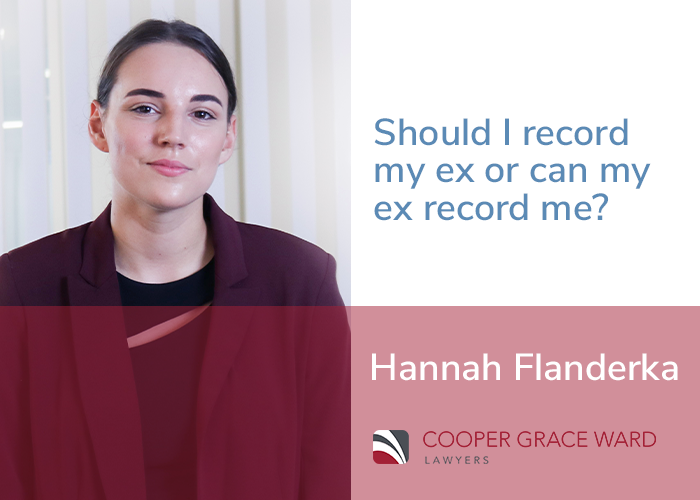- ExpertiseMenuMenuMenuMenu
- Team
- CareersMenuMenu
- News and insights
- On demand
- Training services
- Events

In this week’s video, CGW family lawyer Hannah Flanderka talks about whether you can video or record your ex. Hannah covers the legality of a recording, the protective factors associated with a recording, and when a recording could actually be disadvantageous to you.
Hi. My name is Hannah Flanderka, and I am a lawyer in the family law team here at Cooper Grace Ward.
In today’s video, I wanted to address a question that clients will ask me from time to time being ‘Can I record my ex or can my ex record me?’
Clients often ask me this in situations of high conflict and sometimes in circumstances of domestic violence or family violence. There are numerous issues to consider in answering this question, but really it depends.
Today I wanted to answer the question by looking at three factors in particular. One, the legality of the recording, two protective factors associated with recording, and three, when recording can actually be potentially disadvantageous to you.
So, legality. In every state and territory of Australia it is unlawful to listen to, secretly record or publish private conversations. However, each jurisdiction has different exceptions, penalties and offenses associated with this. In Queensland, for example, it is lawful to record someone if you are a party to the conversation, regardless of having the other parties’ knowledge or consent. In other states, it is illegal to record someone without their consent unless, for example, you are seeking to protect your lawful interest, it is in the public’s interest or it is in connection with a serious threat of imminent harm. Therefore, if you or someone else was at risk of harm, it would be appropriate to record the perpetrator to the extent that is reasonably necessary to address that risk. However, there remains some advantages and disadvantages of recording.
So, in relation to protective factors, even if a recording is found to be unlawful, it remains open to the Court to exercise their discretion to admit it as evidence. For example, the Court has allowed in recordings of a party harming another party or a child as evidence in order to address the risk of harm that that person poses to the other party or the child. Even in the absence of physical violence or risk, other recordings have been allowed in by the Court. For example, a parent asking child a leading question like, ‘You don’t want to see mummy, do you?’ And that has been used as evidence, as a failure by the parent to comply with their parenting responsibilities. Recordings can also be important for protecting yourself. If your spouse raises false allegations of domestic violence against you and you need to be able to produce evidence to the Court about those allegations.
However, in some circumstances, recording can actually be disadvantageous to you by backfiring and can do more harm to your case than good. For example, as recordings are often made in environments of conflict, a Court could consider a child’s consistent exposure to being recorded or the parents recording each other as an example of risk to the child in of itself. That is, if the recording is seen to exacerbate the conflict, the party may actually be criticised by the Court for doing so. Even if it was a genuine attempt to protect themselves or their child.
This means there is a fine balance, but you must exercise your discretion to maintain. If the recording is done illegally or excessively, it may also be a basis for one party who is being recorded to bring a domestic violence application against the other party. For example, it may be seen as a form of surveillance or an attempt to control the other party. In turn, even if the allegation is not found to be substantiated, it could actually cause the Court to attach less weight to the recording. In short, whether or not to record someone is highly dependent on the circumstances of each case.
If you are concerned about being recorded or recording someone else and you have any questions, please do not hesitate to contact me or another member of the family law team here at Cooper Grace Ward.
This publication is for information only and is not legal advice. You should obtain advice that is specific to your circumstances and not rely on this publication as legal advice. If there are any issues you would like us to advise you on arising from this publication, please let us know.
Subscribe to our interest lists to receive legal alerts, articles, event invitations and offers.



Cooper Grace Ward acknowledges and pays respect to the past, present and future Traditional Custodians and Elders of this nation and the continuation of cultural, spiritual and educational practices of Aboriginal and Torres Strait Islander peoples.
Fast, accurate and flexible entities including companies, self-managed superannuation funds and trusts.